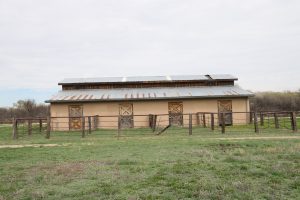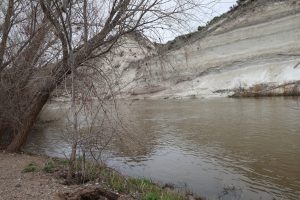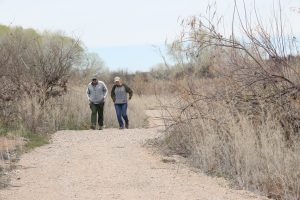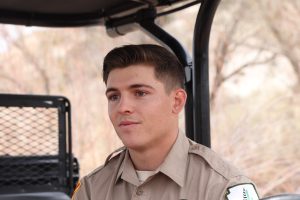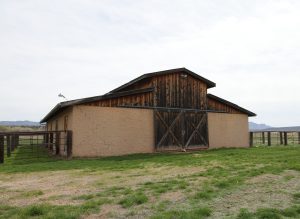- Slug: BC-CNS-Rockin’ River Ranch. 660 words.
- Photos available (thumbnails, captions below).
- Video available.
By Marnie Jordan
Cronkite News
CAMP VERDE – After setbacks and struggles and eager anticipation and waiting, Rockin’ River Ranch State Park opened on Feb. 9.
Arizona’s newest state park sits between Phoenix and Flagstaff, at the confluence of West Clear Creek and the Verde River, where native wildlife, hiking trails and picnic areas have already attracted local and international visitors.
According to the website, the 209-acre state park was originally privately owned and operated as a guest ranch with horse riding and boarding facilities. The state acquired Rockin’ River Ranch in 2008, and master planning happened in 2017 and early in 2018.
But the planning was put on hold because of leadership changes, said Arizona State Parks & Trail spokesperson Michelle Thompson, and when COVID-19 hit in early 2020, development was delayed further.
Thompson said in an email that through March 24, 1,595 visitors have come to the park. Thompson said the park has made just over $9,000, including entrance fees and sales.
Now that the park is open, Sheila Stubler, Rockin’ River Ranch park manager, said there have been visitors from Germany, the Netherlands, England and elsewhere.
“There’s new memories that are going to be built, that whole thing about making memories is one of our focuses,” Stubler said, noting, “we want to be able to provide things for people.”
The state park, located at 4513 S. Salt Mine Road, not only preserves nature and its resources but is now open to the public.
“By making it into a state park, it’s something that’s accessible by all different groups to enjoy the beautiful Verde River,” Stubler said.
History of Rockin’ River Ranch
Brian Lawrence, a resident of Camp Verde, said his grandfather founded Rockin’ River Ranch in 1946, when he sold his 600-acre ranch property in the Valley, moved his family to Camp Verde and bought what he called the Lawrence Ranch.
The ranch is where his dad, aunts and uncles grew up. Lawrence said it used to be a working cattle ranch with horses, pigs and gardens.
“And back in those days, things were not very much different than they were back in the ancient cavalry days. This place was all very primitive,” Lawrence said.
In 1960, Lawrence’s grandfather got sick and was unable to keep up the ranch anymore so he sold it, Lawrence said.
For the next five decades, the ranch was bought and sold by several different owners, until it was purchased in 2008 by the state.
Lawrence said it’s wonderful to have people from all over see Arizona’s diverse landscapes and experience his family’s legacy.
“People that are from all around the country have this impression, this attitude or thought that Arizona is like one big flat desert, kind of like down in Phoenix. And Arizona is actually one of the most diverse states in the United States,” Lawrence said. “It’s just an absolute beautiful place, and people are blown away when they actually come to Arizona.”
Jeremy Gardner, the full-time park ranger, said highlighting the history and geology of the area is important.
“If people learn more about the region, they start to care about the area, they start to put in stakes with it. Then whenever something comes up about maybe damaging the local environment, they might be more against it or they might be more for something that could possibly help conserve that area,” Gardner said.
The park’s staff includes Gardner, Stubler and assistant manager Tom Lenigan, who are aiming to do educational outreach to school groups.
“The education program is currently being developed, and we are excited to engage the public in all that Rockin’ River has to offer,” Stubler said in a text message.
Rockin’ River Ranch State Park is open 9 a.m. to 5 p.m. Friday, Saturday and Sunday, and the entrance fee is $7 per vehicle or $3 per individual/bicycle.
“We are here to serve the public, so that’s what we’re trying to do to the best of our ability with what resources that we have,” Stubler said.
For more stories from Cronkite News, visit cronkitenews.azpbs.org.
